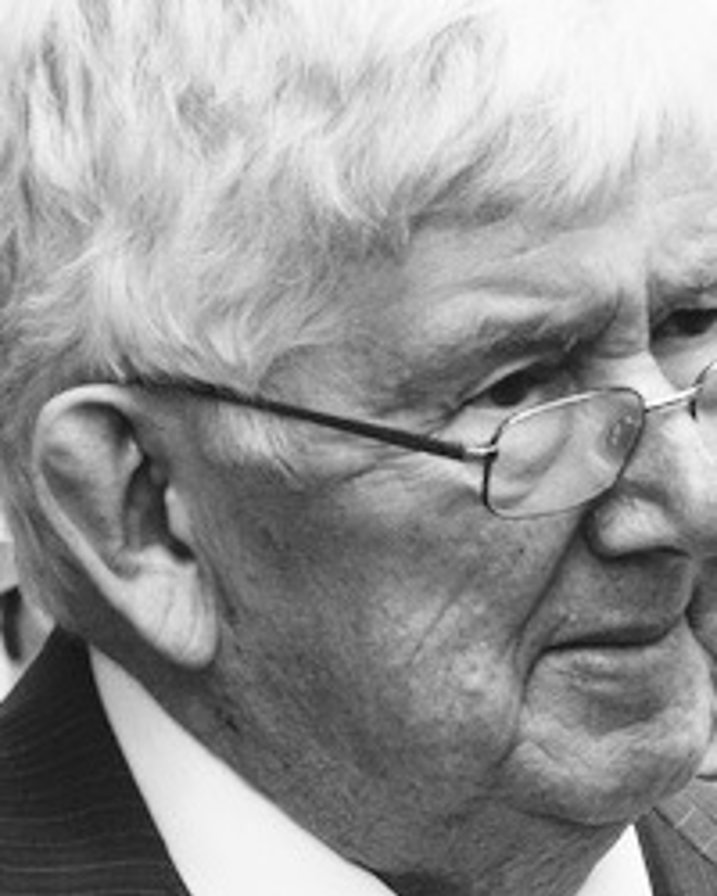Dr Richard Graham Bertrand Evans
Richard Graham Bertrand Evans FRCR
Richard “Dick” Evans was born in London but enjoyed several years in Wales as a childhood evacuee and, subsequently, in Loughborough, where his father was a university lecturer. After graduation, he worked in Derby where he met his wife Ann, a nurse.
Richard was appointed Consultant Radiotherapist in 1966 to the recently opened Northern Region Radiotherapy Centre and the Royal Victoria Infirmary, Newcastle (RVI), following postgraduate training at the London Hospital and University College Hospital, London (UCH). At the latter, he worked with Dr Gwen Hilton who, in her turn, had trained with the Curies in Paris and from whom he learned the importance of meticulous fractionation. In the 1960s, Richard was one of the new generation of specialist trained radiotherapists who did not have a surgical background and his arrival in Newcastle heralded ‘modern clinical oncology’ in the north east.
At UCH he worked with haematologist Professor Tom Prankerd and on arrival in Newcastle he started to work with Dr RB Thompson at the RVI. Intra-venous radioactive phosphorus (P-32) had become standard treatment for polycythaemia rubra vera but haematologists were not licensed to administer it. Richard was able to do so and the new treatment was introduced. Early papers reporting the efficacy of radiotherapy for Hodgkin’s disease were corroborated by trials in the early 1960s and it was Richard who introduced the more effective extended field radiotherapy for Hodgkin’s disease to Newcastle.
Lymphangiography had proved a valuable investigation elsewhere but was not available in Newcastle. Accordingly, a young trainee, Dr Vel Atkinson, was recruited to develop it. These initiatives were the start of a joint haematology clinic, which, with haematologists in the region, led to a regional lymphoma discussion group. With input from Scottish colleagues, this eventually became the fruitful Scotland & Newcastle Lymphoma Group in 1991.
_______________________________
1st January 1932 to 27th February 2023
Richard had also worked with children in London but found paediatric oncology was lacking in Newcastle. He established paediatric radiotherapy and suggested that a trainee, Alan Craft, should obtain experience at the Royal Marsden Hospital. It was Alan, now Professor Sir Alan, who returned to develop a superb children’s oncology service with Richard at the RVI, now the Great North Children’s Hospital.
Together with his colleagues, Richard was, initially, a general radiotherapist and oncologist. Over time he developed specialist multidisciplinary groups and clinics in a variety of oncology subspecialties including ear nose and throat, gynaecology, breast, cancer, neurosurgery, and a joint clinic with urology for testis and bladder cancers. Cytotoxic chemotherapy for adult solid tumours was still in its infancy when he was appointed in 1966. Richard used it cautiously and mainly for breast and testis cancers, until the appointment of Professor Adrian Harris in 1980 and the development of academic medical oncology in Newcastle.
In addition to being Clinical Director of Oncology in Newcastle (1986-91), Richard was elected to the Council of the Royal College of Radiologists, where he served as a Senior Examiner, Treasurer (1988-90), Warden of the Fellowship (1990-92), and Warden of the Faculty of Clinical Oncology (1990-94). As Warden, he was responsible for organising the training and examination of clinical oncology trainees nationally and internationally. The first syllabus for “Structured Training in Clinical Oncology” was published under his leadership in 1995. He travelled extensively, enjoying the teaching and examining of future oncologists and the admission of new Fellows, insisting always that his wife Ann travel with him. Richard was a wise and generous trainer and many trainees have expressed their gratitude for his personal encouragement and support, which proved influential in their careers.
Reflecting on retirement (in 1994), he recalled a sense of privilege that he had enjoyed such a fulfilling career but added that he had become tired of being told that the future of cancer therapy lay with high doses of chemotherapy and no longer with radiotherapy.
Richard’s family life was marred by the death of his younger daughter, Alison, when only forty. The sadness of this never left him but he and Ann were very sociable and generous in their hospitality. Predeceased by Ann, his wife for sixty-two years, he leaves his daughter, Caroline, two sons-in-law, John and Michael, three grandchildren, and two grand-stepchildren.
Memoir authors: HH Lucraft, PJDK Dawes, U Mallick, RR Hall
